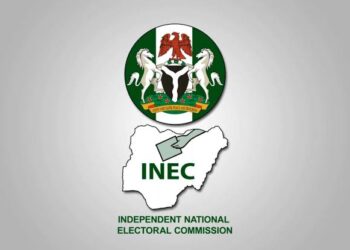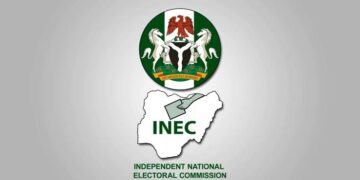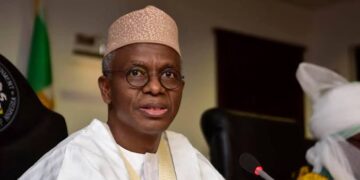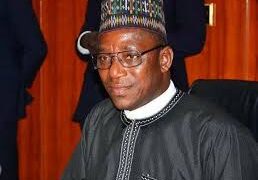There seems to be a glimmer of hope for many election-interested diaspora individuals, as the Independent National Electoral Commission has said it is proposing several electoral reforms in 2025 that will result in the introduction of diaspora voting.
The electoral body also noted that it would oversee the phasing out of the use of permanent voter cards during elections.
Following a meeting with resident electoral commissioners in Abuja on Thursday, the chairman, Prof. Mahmood Yakubu, announced the recommended reforms.
The commission stated that the suggested changes were the outcome of a meeting held Thursday in Abuja between the chairman, Prof. Mahmood Yakubu, and the Resident Electoral Commissioners.
The Senate and House of Representatives’ pertinent committees will soon hear the suggestions, according to INEC.
The INEC boss said, “Among the major highlights of the commission’s recommendations is the imperative of legal clarity in result management with regard to manual transfer versus the electronic transmission of results.
“The commission also believes that with the introduction of the Bimodal Voter Accreditation System, the use of the Permanent Voters’ Cards as the sole means of identification for voter accreditation on election day should be reviewed. Those who already have the PVCs can still use them to vote, but going forward, computer-generated slips issued to the voter or even downloaded from the commission’s website will suffice for voter accreditation.
“This will not only save costs; it will also eliminate the issues around the collection of PVCs and the diabolical practice of buying up the cards from voters in order to disenfranchise them.”
He added that there were also recommendations in support of diaspora voting, the unbundling of the commission with the establishment of an electoral offences tribunal, and a separate agency to handle the registration and regulation of political parties.
He added that the commission would similarly step up action on voter access and distribution to polling units.
INEC Chairman explained that these recommendations were captured in a 524-page review report on the 2023 general elections.
He said, “With the conclusion of five major off-cycle governorship elections and nine out of 21 bye-elections since the 2023 general elections, this is the most appropriate time for us to commence the implementation of the recommendations arising from our review of the general elections.
“From the internal and external engagements, the commission has identified 142 recommendations dealing with the general state of preparedness, voter management, voter education and public communication, political parties and candidate management, electoral operations and logistics management, election officials and personnel, partnership and collaboration, monitoring and supervision, election technology, voting and result management, election security, electoral offences, and the electoral legal framework,” the chairman said.
Of these, 86 call for the commission to take administrative action, 48 rely on cooperation with stakeholders like security services and civil society groups, and 8 entail National Assembly legislative revisions.
Yakubu pointed out that 86 of the 142 recommendations call for the commission to take administrative action. “Because you are the ones on the front lines of putting the suggestions into practice, it is important that we start by talking to our resident electoral commissioners.
“This is followed by 48 recommendations that require action by a variety of stakeholders, including security agencies, mobile network operators, statutory bodies, political parties, transport unions, civil society organisations, and the media.
“On the legal review, there are eight recommendations that require legislative action by the National Assembly. Very soon, the commission will make a presentation to the Joint Committee of the Senate and House of Representatives on Electoral Matters as they continue to deliberate on electoral reform,” he said.
Yakubu pointed out that the necessity for a more efficient procedure has been brought to light by the implementation of the Bimodal Voter Accreditation System.
To cut expenses and end voter card-buying schemes, he proposed the replacement of Permanent Voter Cards with computer-generated slips or digital credentials for voter accreditation.
To accommodate residents who are unable to cast ballots at their registered polling places, including INEC employees, security guards, and Nigerians residing overseas, Yakubu also disclosed plans to implement early and diaspora voting.
Cleaning up the voter registration in coordination with the National Identity Management Commission and strengthening ties with transport unions to guarantee the prompt distribution of election materials are two more important reform areas.
The commission also plans to intensify voter education campaigns to combat misinformation and promote greater participation by marginalised groups.
“As a matter of urgency, the commission also intends to develop protocols for the cleaning up of the voters’ register in collaboration with other agencies such as the National Identity Management Commission and the National Population Commission. Other areas of reform include advocacy for affirmative action for greater participation of under-represented groups, a more robust voter education and public communication to combat fake news and misinformation,” Yakubu stated.
It is also important to recall that a Bill to Amend the constitution and provide for diaspora voting has scaled second reading in the House of Representatives on Wednesday.
The bill, co-sponsored by the Speaker, Abbas Tajudeen and Sodeeq Abdullahi, seeks to amend the 2022 Electoral Act and provide opportunities for Nigerians in Diaspora to vote.




































